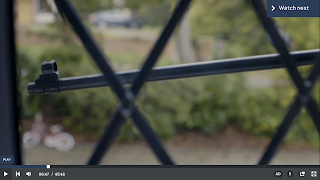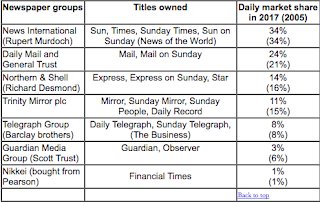Regulation
In the UK, television has a 'watershed' period which has been agreed that inappropriate content is shown only after 9pm, and this prevents young children from being exposed to things like extreme violence and nudity. This also means that the channels get less complaints.
Ofcom is the regulatory service in the UK which oversees the regulation of British TV. It helps reduce harm and offence by limiting it. It is "required to assess the likelihood of material encouraging or inciting the commission of crime or of leading to disorder", which could be something which portrays racial hatred and encourages things like hate crimes.
The mass media can be used to manipulate groups of people, and a main concern with this is the hypodermic syringe theory. This is a passive audience theory, which means that people just take in and copy what they see.
Sonia Livingstone and Peter Lundt theorised that regulation very rarely works, and this is because the internet makes it much easier to access things that were previously not able to be viewed by younger audiences. This means that regulation almost doesn't exist.
Harm and Offence - this is where something can cause someone to be upset. Examples of this from 'Humans':

Here, Matilda (Mattie) is preparing to shoot one of her neighbour's synths. The image of a rifle could be deemed as offensive to some people and her act can be seen as violent. This is also an Air rifle, which is fairly easy to get hold of and therefore people will find it easy to imitate.

In this image, Mia (Anita) is being dragged away from Leo and Max along with Niska and Fred. This is kidnapping, and would be a seemingly scary and traumatic to some people. She is also overpowered by the kidnapper and can be seen as weak and vulnerable, therefore some people would feel scared by it.
The branding here alludes to historical events like slavery and the holocaust. As well as this, animals like cattle are branded. This dehumanises them, even though they are robots. It is also a reminder of a time which many people are still affected by today. It could incite racial hatred amongst some people.

Although Odi is not dead in this image, the sauce around him and the way his body is laid is representative as someone being dead. This could evoke emotions in people such as PTSD where they remember something bad and become traumatised. When you are young, you may also not know this is not a human and this could be saddening.
Mattie is holding the rifle to Anita's head, and this may be problematic because she is so young but also the behaviour can be easily imitated once again. It is quite sinister because she has the intention to kill her. There is also an intertextual reference to films like westerns, and in these films characters are violent and show no remorse for their actions.

Here, Niska is in the brothel and she is being forced to have sex. She doesn't speak, she is being overpowered by a man and also she doesn't give any verbal consent - therefore this would be rape. Morally, it isn't wrong as she is not human, however due to her humanoid form this could make the audience feel empathy, however it is also potentially traumatic to some viewers. It is fairly taboo to most people.
Reception theory is the way that people take in media products, and it is about the ideology of the producer. If you have a dominant reading to the product, you see it as it was intended and you agree with the producer. For 'Humans', it would be that people are too reliant on technology to the point that we even have humanoid robots to do everything we have. This displays how technology is leading us to go out of control.
AGREED READING - that the family has become lazy and complacent, relying on technology to do the housework whilst they sit around and watch TV, doing nothing productive.
NEGOTIATED READING - although they have the new technology, and they are relying on it, this has meant that they have family time and that they have more time to be together, although they are using the television.
OPPOSITIONAL READING - people aren't relying on technology, because they are simply using it so that they can do other things.
Ofcom is the regulatory service in the UK which oversees the regulation of British TV. It helps reduce harm and offence by limiting it. It is "required to assess the likelihood of material encouraging or inciting the commission of crime or of leading to disorder", which could be something which portrays racial hatred and encourages things like hate crimes.
The mass media can be used to manipulate groups of people, and a main concern with this is the hypodermic syringe theory. This is a passive audience theory, which means that people just take in and copy what they see.
Sonia Livingstone and Peter Lundt theorised that regulation very rarely works, and this is because the internet makes it much easier to access things that were previously not able to be viewed by younger audiences. This means that regulation almost doesn't exist.
Harm and Offence - this is where something can cause someone to be upset. Examples of this from 'Humans':

Here, Matilda (Mattie) is preparing to shoot one of her neighbour's synths. The image of a rifle could be deemed as offensive to some people and her act can be seen as violent. This is also an Air rifle, which is fairly easy to get hold of and therefore people will find it easy to imitate.

In this image, Mia (Anita) is being dragged away from Leo and Max along with Niska and Fred. This is kidnapping, and would be a seemingly scary and traumatic to some people. She is also overpowered by the kidnapper and can be seen as weak and vulnerable, therefore some people would feel scared by it.
The branding here alludes to historical events like slavery and the holocaust. As well as this, animals like cattle are branded. This dehumanises them, even though they are robots. It is also a reminder of a time which many people are still affected by today. It could incite racial hatred amongst some people.

Although Odi is not dead in this image, the sauce around him and the way his body is laid is representative as someone being dead. This could evoke emotions in people such as PTSD where they remember something bad and become traumatised. When you are young, you may also not know this is not a human and this could be saddening.
Mattie is holding the rifle to Anita's head, and this may be problematic because she is so young but also the behaviour can be easily imitated once again. It is quite sinister because she has the intention to kill her. There is also an intertextual reference to films like westerns, and in these films characters are violent and show no remorse for their actions.

Here, Niska is in the brothel and she is being forced to have sex. She doesn't speak, she is being overpowered by a man and also she doesn't give any verbal consent - therefore this would be rape. Morally, it isn't wrong as she is not human, however due to her humanoid form this could make the audience feel empathy, however it is also potentially traumatic to some viewers. It is fairly taboo to most people.
Reception theory is the way that people take in media products, and it is about the ideology of the producer. If you have a dominant reading to the product, you see it as it was intended and you agree with the producer. For 'Humans', it would be that people are too reliant on technology to the point that we even have humanoid robots to do everything we have. This displays how technology is leading us to go out of control.
AGREED READING - that the family has become lazy and complacent, relying on technology to do the housework whilst they sit around and watch TV, doing nothing productive.
NEGOTIATED READING - although they have the new technology, and they are relying on it, this has meant that they have family time and that they have more time to be together, although they are using the television.
OPPOSITIONAL READING - people aren't relying on technology, because they are simply using it so that they can do other things.




Comments
Post a Comment